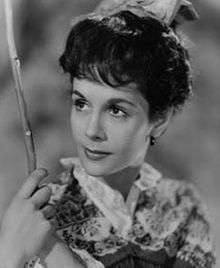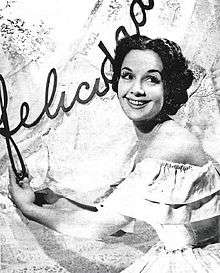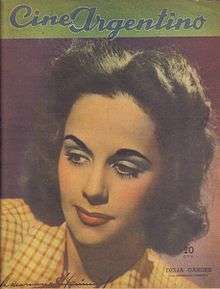Delia Garcés
| Delia Garcés | |
|---|---|
 | |
| Born |
Delia Amadora García Gerboles 13 October 1919 Buenos Aires, Argentina |
| Died |
7 November 2001 (aged 82) Buenos Aires, Argentina |
| Nationality | Argentine |
| Occupation | Actress |
| Years active | 1936-1966 |
Delia Amadora García Gerboles better known as Delia Garcés (Spanish pronunciation: [ˈdelja ɣarˈses]; 13 October 1919 – 7 November 2001) was an Argentine film actress of the Golden Age of Argentine Cinema (1940–1960). She made almost 30 appearances in film between 1937 and 1959 and acted on stage from 1936 to 1966. She won the Premios Sur Best Actress award three times from the Argentine Academy of Cinematography Arts and Sciences, as well as the Argentine Film Critics Association's Silver Condor Award for Best Actress, the Premios Leopold Torre Nilsson, Premio Pablo Podestá, and the inaugural ACE Platinum Lifetime Achievement Award from the Asociación de Cronistas del Espectáculo.
Biography
Delia Amadora García[1] Gerboles was born 13 October 1919 to Gabriel García and Amadora Gerboles in Buenos Aires, Argentina.[2] She was a student of the Labardén Children's Theatre and trained at the Conservatorio Nacional de Música y Arte Escénico (National Conservatory of Music and Performing Arts) and the Comedia Nacional at the Teatro Nacional Cervantes. Claiming she had always been a "theater rat",[1] and performed her first role at age 8,[3] she trained with students like Zully Moreno, Nury Montsé, Fanny Navarro, and Malisa Zini.[1] Students received a small monthly stipend and participated in plays to hone their skills many taking pseudonyms. Between the performances of Mandinga en la sierra and Cyrano de Bergerac, María Luisa Zambrini became Malisa Sambrini and Delia Gerbolés became Delia Garcés.[4] One of her teachers, Cunil Cabanillas, gave her her first professional role in a small part of the 1936 production of Locos de verano, a play written by Gregorio de Laferrère.[5]

Her debut in film occurred in the 1937 in ¡Segundos afuera! directed by Chas de Cruz and Alberto Echebehere.[2] Later that same year, she was in the film Viento Norte directed by Mario Soffici, which caught the interest of critics[1] as it was widely seen as the best film of the year.[6] She followed those with Maestro Levita (1938), Kilómetro 111 (1938),[1] Doce mujeres (1939), and La vida de Carlos Gardel (1939),[7] with Hugo del Carril and Elsa O’Connor[8] under the direction of Alberto de Zavalía, who she would soon marry.[9] Almost from the beginning, her acting persona was of a naïve heroine, an elfin beauty, who appeared fragile, but had a touch of impishness that portrayed strength and daring.[10]
De Zavalía made eleven films with Garcés[11] showcasing her in Dama de compañía (1941); Veinte años y una noche (1941),[1] her first of several films with Spanish actor Pedro López Lagar;[12] Malambo (1942); and others.[1] In 1941 she won a Premios Sur for Best Actress from the Argentine Academy of Cinematography Arts and Sciences for Veinte años y una noche[13] and repeated the award in 1942 for Malambo,[14] which was presented by Orson Welles.[7]
Garcés starred in "La maestrita de los obreros"[11] in 1942 directed by her husband with Oscar Valicelli, Felisa Mary, Orestes Caviglia, among others.[15] In 1943, she made Casa de muñecas[1] and was highly praised for her portrayal of "Nora" in the film which was directed by Ernesto Arancibia.[11] Filming began in 1944 for La Dama Duende in which Garcés starred, directed by Luis Saslavsky, in an elaborate film based on a seventeenth-century Spanish play by Pedro Calderón de La Barca. With the exception of Saslavsky and Garcés, all the other facets of the play were done by the Spanish émigré community.[16] Garcés won her third Premios Sur Best Actress award from the Argentine Academy of Cinematography Arts and Sciences in 1945.[17]
That same year, Garcés formed her own theatrical company and in March premiered the first play of Homero Manzi and Ulises Petit de Murat, La novia de arena, at the Odeón Theater. In her troupe, besides herself were: Alba Castellanos, Orestes Caviglia, Margarita Corona, Enrique Alvarez Diosdado, Alita Román, Domingo Sapelli, and Milagros de la Vega.[18] Having completed a run of the play, her company continued at the Odeón and performed her "farewell" theatrical production in Argentina, Claudia by Rose Franken. After the performance, due to the political situation with Juan Peron's government, she and her husband planned to leave Argentina.[19] But, they stayed and in 1946, she performed La eterna ninfa at the Odeón[20] and filmed Rosa de América directed by her husband with Orestes Caviglia, Antonia Herrero, Elsa O’Connor, among others.[21] She earned praise for her roles in El gran amor de Bécquer (1946) and El hombre que amé (1947)[11] and in 1948, she performed in the play El otro yo de Marcela which was so successful that it led to a film by the same name two years later,[20] in which she sang and danced.[11]

In 1951, Garcés and de Zavalía went to Mexico and she made one of her most memorable films there in 1951[2]-1952. In Él directed by Luis Buñuel,[22] she played Gloria, the wife of the jealous and paranoid Francisco, played by Arthur Cordova. The film, though released in Mexico in 1953[2] and presented at the 1953 Cannes Film Festival,[23][24] was not released in Argentina until 1958.[2] Almost immediately, in March, 1953, she began work on Lágrimas robadas in Mexico with Andrea Palma under the direction of Julián Soler.[25]
Garcés then did a tour of Latin America which included Chile, Peru, Colombia, Venezuela and Puerto Rico covering the plays Casa de muñecas, Leocadia, Nina, Tesá, La voz de la tórtola, El balcón de Julieta all with her husband, and La llave en el desván by Alejandro Casona, before arriving in Spain.[26] She began filming Rebeldía under the direction of José Antonio Nieves Conde which was based on the play La luz de la víspera by José María Pemán.[27]
In 1955, they were able to return to Argentina and Garcés starred in Mi marido y mi novio, directed by Carlos Schlieper. The film was forward-thinking for the times, with Garcés poking fun at gender stereotypes and singing of women being as free as men.[7] She made her last film, Alejandra in 1956 for which she won the Argentine Film Critics Association's Silver Condor Award for Best Actress.[28]
In 1958, she and de Zavalía had a season at the National Theater of Paris, performing as the Buenos Aires Theater Company in the production of La Carroza de San Sacramento by Prosper Mérimée and El Límite by de Zavalía.[29] That same year, she starred in a television series on Channel 9, Lo mejor de nuestra vida, nuestros hijos, directed by Alberto Migré based on stories by Julio César Barton.[30] She and her husband also performed at the Teatro Nacional Cervantes in both 1958 and 1959, completing No es cordero... que es cordera and then doing several guest appearances the following year.[31] In 1961, Garcés starred in La doncella prodigiosa, a play by her husband, de Zavalía at the Teatro Nacional Cervantes under the direction of Fernando Labat.[32]
.jpg)
From 1960 on, Garcés dedicated herself launching the Teatro San Martín.[1] She had memorable performances in Ondine by Jean Giraudoux; Saint Joan by George Bernard Shaw; The Living Room by Graham Greene; The Turn of the Screw by Henry James;[11][33] and the 1966 production of El jardín de los cerezos (The Cherry Orchard) by Anton Chekhov which was her last performance before she retired[2] to care for her husband through his last long final illness.[7] She may also have been prevented from performing, as her name appeared on the list of banned artists during the 1979 dictatorship.[34] She appeared briefly in a tribute that Mirtha Legrand did for Channel 9 on the death of Daniel Tinayre.[3][35]
She joined the board of the National Endowment for the Arts and worked with them throughout her retirement.[11][33] In 1982, she received the Premios Leopoldo Torre Nilsson[36] In 1995, she received the Premio Pablo Podestá[37] and a room at the Tita Merello Complex on Suipacha Street was named in her honor by the Institute of Cinema and Audiovisual Arts to acknowledge her stature in Argentine film.[3][38] On 29 October 2001 she won the first ACE Platinum Lifetime Achievement Award ever presented by the Asociación de Cronistas del Espectáculo (Association of reporters of Show Business)[11]
Garcés died on 7 November 2001 in Buenos Aires, Argentina.[2]
Awards
- 1941 Premios Sur for Best Actress for Veinte años y una noche[13]
- 1942 Premios Sur for Best Actress for Malambo[14]
- 1945 Premios Sur for Best Actress for La dama duende[17]
- 1957 Silver Condor for Best Actress for Alejandra[28]
- 1959 Won the World Cinema Golden Figurine from Peru[39]
- 1982 Premios Leopold Torre Nilsson[36]
- 1995 Premio Pablo Podestá[37]
- 1996 Dedication of Delia Garcés room at the Tita Merello Complex[38]
- 2001 ACE Platinum Lifetime Achievement Award[11]
Filmography
- ¡Segundos afuera! (1937)
- Viento Norte (1937)
- Melgarejo (1937)
- Maestro Levita (1938)
- Villa Discordia (1938)
- Kilómetro 111 (1938)
- Doce mujeres (1939)
- Alas de mi patria (1939)
- La vida de Carlos Gardel (1939)
- Gente bien (1939)
- Muchachas que estudian (1939)
- Dama de compañía (1940)
- Veinte años y una noche (1941)
- La maestrita de los obreros (1942)
- Concierto de almas (1942)
- Malambo (1942)
- Casa de muñecas (1943)
- La dama duende (1944)
- Rosa de América (1946)
- El gran amor de Bécquer (1946)
- El hombre que amé (1947)
- De padre desconocido (1949)
- El otro yo de Marcela (1950)
- Él (1952) (in Mexico)
- Lágrimas robadas (1953) (in Mexico)
- Rebellion (1954) (in Spain)
- Mi marido y mi novio (1955)
- Alejandra (1956)
External links
References
- 1 2 3 4 5 6 7 8 9 Zancada, Ana María (24 November 2009). "Delia Garcés y la belleza exquisita" (in Spanish). Argentina: El Litoral. Retrieved 15 June 2015.
obit
- 1 2 3 4 5 6 7 Pérez Leira, Lois. "Delia Garcés: A diva galega do cine latinoamericano". Enciclopedia da emigracion galega. (in Spanish). Santiago de Compostela, Spain: Secretaría de Estado de Inmigración y Emigración Galicia, España. Retrieved 15 June 2015.
- 1 2 3 Stiletano, Marcelo (9 November 2001). "Delia Garcés fue una gran dama de la escena nacional" (in Spanish). Buenos Aires, Argentina: La Nacion. Retrieved 16 June 2015.
- ↑ Seibel, Beatriz (2010). Historia del Teatro Nacional Cervantes, 1921-2010 (PDF) (in Spanish). Buenos Aires: Instituto Nacional del Teatro. p. 36. ISBN 978-987-9433-93-5. Retrieved 16 June 2015.
- ↑ "Efemérides de Noviembre: 1913". Soy Patriota (in Spanish). Argentina: Soy Patriota. Retrieved 15 June 2015.
- ↑ Finkielman, Jorge (2004). The film industry in Argentina : an illustrated cultural history. Jefferson, NC [u.a.]: McFarland. pp. 219–221. ISBN 0-7864-1628-9. Retrieved 16 June 2015.
- 1 2 3 4 "Una rosa blanca" (in Spanish). Buenos Aires, Argentina: Página 12. 16 November 2001. Retrieved 16 June 2015.
- ↑ "Spanish Films Now Offered at Rialto". Bakersfield, California: The Bakersfield Californian. 4 December 1940. p. 10. Retrieved 16 June 2015 – via Newspapers.com.

- ↑ Plazaola, Luis Trelles (1989). South American cinema : dictionary of film makers (1st ed.). Río Piedras, P.R.: Editorial de la Universidad de Puerto Rico. p. 72. ISBN 0-8477-2011-X.
- ↑ Schoo, Ernesto (9 November 2011). "Menuda, esbelta y de conducta rigurosa" (in Spanish). Buenos Aires, Argentina: La Nacion. Retrieved 17 June 2015.
- 1 2 3 4 5 6 7 8 9 "Falleció Delia Garcés, la dama de la escena" (in Spanish). Argentina: Río Negro. 9 November 2001. Retrieved 16 June 2015.
- ↑ Luna, Féliz (1986). Ortiz: reportaje a la Argentina opulenta (in Spanish) (8ava. ed.). Buenos Aires: Editorial Sudamericana. p. 90. ISBN 9789500700443.
- 1 2 "1941 Premios Anuales". Academia de Cine (in Spanish). Buenos Aires: Academia de las Artes y Ciencias Cinematográficas de la Argentina. 31 May 2014. Retrieved 16 June 2015.
- 1 2 "1942 Premios Anuales". Academia de Cine (in Spanish). Buenos Aires: Academia de las Artes y Ciencias Cinematográficas de la Argentina. 31 May 2014. Retrieved 16 June 2015.
- ↑ Landro, Mónica; Speroni, Marta (2006). Cine sonoro argentino: 1933 - 1943 (in Spanish) (1 ed.). Buenos Aires: El Calafate Eds. p. 278. ISBN 9789871038046. Retrieved 16 June 2015.
- ↑ Barnard, Timothy; Rist, Peter (1998). South American Cinema: A Critical Filmography, 1915-1994. Austin, Texas: University of Texas Press. pp. 47–49. ISBN 978-0-292-79210-4. Retrieved 16 June 2015.
- 1 2 "1945 Premios Anuales". Academia de Cine (in Spanish). Buenos Aires, Argentina: Academia de las Artes y Ciencias Cinematográficas de la Argentina. 31 May 2014. Retrieved 16 June 2015.
- ↑ Carey, Bernardo. "Teatro: ¿una experiencia frustrada de Manzi?". Teatro del Pueblo (in Spanish). Buenos Aires, Argentina: Teatro del Pueblo. Retrieved 16 June 2015.
- ↑ Famá Hernández, Roberto (16 June 2010). ""Claudia" con Delia Garcés en el Teatro Odeón (año 1945)". Colecciones Teatrales (in Spanish). Argentina: Colecciones Teatrales. Retrieved 11 June 2015.
- 1 2 Schoo, Ernesto (15 October 2005). "Delia Garcés, la eterna ninfa" (in Spanish). Buenos Aires, Argentina: La Nacion. Retrieved 16 June 2015.
- ↑ Paietta, Ann C. (2005). Saints, clergy and other religious figures on film and television, : 1895 - 2003. Jefferson, N.C. [u.a.]: McFarland. p. 131. ISBN 0-7864-2186-X. Retrieved 16 June 2015.
- ↑ Acevedo-Muñoz, Ernesto R. (2003). Buñuel and Mexico: the crisis of national cinema ([Online-Ausg.]. ed.). Berkeley [u.a.]: Univ. of Calif. Press. p. 155. ISBN 0-520-23952-0. Retrieved 16 June 2015.
- ↑ Motta, Carlos Gustavo (June 2013). "Lacan y el cine". Virtualia (in Spanish). Retrieved 16 June 2015.
- ↑ "Official Selection 1953 : In Competition". Festival Cannes. Festival de Cannes. Retrieved 16 June 2015.
- ↑ Ibarra, Jesús (2006). Los bracho : tres generaciones de cine mexicano (in Spanish) (1ra. ed.). México, D.F.: Universidad Nacional Autónoma de México. pp. 52–53. ISBN 970-32-3074-1.
- ↑ "Delia Garces, la Actriz Argentina de Teatro y de "Cine", Ha Venido a España para Interpretar el Primer Papel en una Pelicula" (in Spanish). Madrid, Spain: Hemeroteca. ABC España. 2 August 1953. p. 15. Retrieved 16 June 2015.
- ↑ "Rebeldía · España-Alemania 1953". Cervantes Virtual (in Spanish). Spain: Fundación Biblioteca Virtual Miguel de Cervantes. Retrieved 16 June 2015.
- 1 2 Posadas, Abel (1994). Carlos Schlieper (in Spanish). Buenos Aires: Centro Editor de América Latina. p. 61. ISBN 950-25-3166-3. Retrieved 16 June 2015.
- ↑ Pellettieri, Osvaldo (1995). El teatro y los días: estudios sobre teatro argentino e iberoamericano (in Spanish) (1a ed.). Buenos Aires: Editorial Galerna. pp. 313–314. ISBN 950-556-339-6. Retrieved 16 June 2015.
- ↑ Sierra, Patricia (April 2007). "Un poco de historia... Radio El Mundo". Radio Teatro Hoy (in Spanish). Buenos Aires, Argentina: Radio El Mundo. Retrieved 16 June 2015.
- ↑ "Seibel (2010)", pp 77, 83
- ↑ "Seibel (2010)", p 85
- 1 2 Haimovich, Laura (9 November 2001). "Murió Delia Garcés, una leyenda de los años de oro del cine argentino" (in Spanish). Buenos Aires, Argentina: Clarín. Retrieved 16 June 2015.
- ↑ "La lista del '79" (in Spanish). Buenos Aires, Argentina: Página 12. 8 November 2013. Retrieved 16 June 2015.
- ↑ "Mirtha Legrand despues de la muerte de Daniel Tinayre (1994)". YouTube (in Spanish). Argentina: Archivo DiFilm. 1994. Retrieved 16 June 2015.
- 1 2 "Premio a Delia Garcés: Recibió la distinción "Leopoldo Torre Nilsson"". ACCEDER (in Spanish). Buenos Aires, Argentina: Ministerio de Cultura. 5 December 1982. Retrieved 16 June 2015.
La Razón, Buenos Aires, s. n., 5 de diciembre de 1982
- 1 2 "Delia Garces gana el Premio Podesta 1995". YouTube (in Spanish). Buenos Aires, Argentina: Archivo DiFilm. 1995. Retrieved 17 June 2015.
- 1 2 Martinez, Marcos; Lopez, Alejandra (6 April 1997). "El boom de los nuevos cines" (in Spanish). Buenos Aires, Argentina: La Nacion. Retrieved 17 June 2015.
- ↑ "world cinema gold figure Peru 1959". ecrater. Retrieved 16 June 2015.